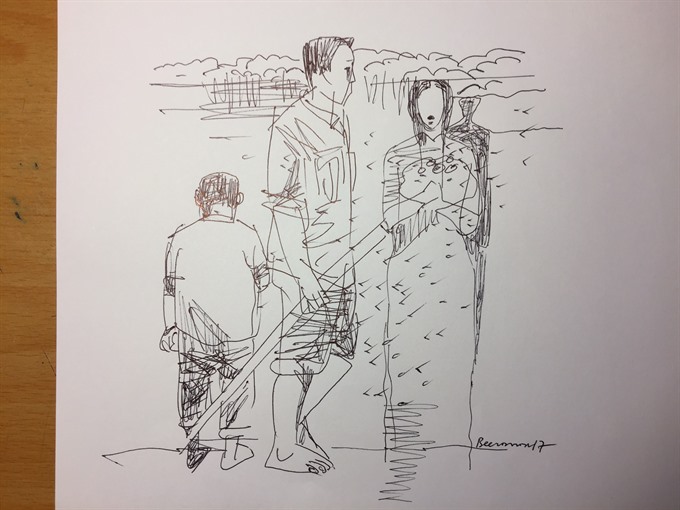

A short story by Như Bình
 |
by Như Bình
Returning home after a busy afternoon in the peach field, my father wearily sat down on the wooden plank bed and rubbed the dirt off his trousers. Then, he picked up the thuốc lào (tobacco pipe), put a small pinch of tobacco into its bowl, struck a match and began smoking. He seemed so lost in thought that he nearly forgot my presence in the hut. To me, he was worrying about his peach field. In these silent moments he remembered how he had given up everything behind in the city: his profitable job as a doctor in a renowned hospital and his beautiful home close to his parents’ place, so he could settle down here on a rented plot of land near the river bank in the countryside to grow peach trees, whose blossoms he liked best.
* * *
Growing up, I was often a silhouette beside him, always busy at work in the field. Most of my memories about the brilliantly-lit city, about my father, with his spectacles and scrubs were vividly etched in my mind. To me, he was so taciturn a man that I asked myself, “Am I really his daughter, or just a small person like a peach tree growing beside him?”
He was very fond of peach trees, which were in full bloom just once a year, in early spring, or roughly speaking, right on Tết. He set aside land for wild peach trees, inside his vast garden where a lot of flowers or blossoms sprung according to their seasons. That’s why his peach blossoms could hardly be seen most of the year amid a forest of multi-coloured flowers on the riverbank. It was a splendid paradise on earth for him to enjoy to his heart’s content. In the centre of that vast field, he rigged up a small hut large enough for a bed and a hammock for us to lie in. I usually contemplated his small garden full of wild peach trees while he was busy in the field. Whenever spring came round, he sat smoking on the plank bed and looked at the peaches in bloom, or at the end of spring when dead peach blossoms covered the ground when the wind blew. I was interested in something else: the time when the peach buds began opening. They looked like tiny suns perching on the green canopy that cheerfully smiled their greetings to me and the wonderful scenery.
As a mischievous little girl, I usually shouted loudly while lying in the hammock hung in the heart of the hut.
“Keep quiet while your Dad is relaxing,” old Bền, chief of the workers, warned me. I just smiled at him. “When you grow up, I’ll tell your father to send you to town,” he went on.
“Oh no no, I prefer staying here in the peach field,” I objected.
Meanwhile, Dad remained lost in thought, taking no notice of our argument.
“Is he really aware of my presence in this peaceful and lonely place?” I asked myself.
It seemed to me that he was still indulging in the dead peach blossoms that nearly fully covered the ground .
In his large field he grew all types of peach trees from different localities with every description: north-western forest, Mộc Châu plain, Central Highlands Plateaux and Hà Nội suburban districts, together with some other kinds. Each of them boasted a special blossom of its own with a different hue.
In general, my father never sold any wild peach trees from the jungles.
“Your Dad plants them here for pleasure or for your Mum’s homecoming,” old Bền said to me one day. From my early childhood up to now, nobody had ever told me anything about my mother. I knew nothing about her.
“To rent this vast piece of land for growing peach trees, your Dad had to sell most of his possessions,” added the old gardener. “He plants tender, well-shaped peach trees for business during Tết and the others so he can relax and meditate.”
I did not know anything about the problems of grown-ups. Moreover, I did not pay attention to his affectionate behaviour when he held me in a warm embrace or when he called my name. What made me happy was that with my bare feet I could tread on the dead peach blossoms strewn on the soft ground flooded with sunshine or lie under the shade of the trees to enjoy their withered blossoms perching on my cheeks. What’s more, I did not have to go to school like the other kids around here on weekdays. Both of us led a simple life like prehistoric man thousands of years ago, except for one thing: we lived amid a forest of flowers and blossoms.
* * *
This year Tết came round earlier than usual. The peach field was still bathed in spring sunshine. My father, half naked, was busy tending his garden of artificially-shaped peach trees ordered by his usual customers a few months before Tết. Every morning he watered them with a big pump placed at the river bank. Most of these peach trees had been cast away when last year’s Tết holiday ended. They were collected and brought home by Dad’s gardeners just after Tết, when their blossoms had withered or fallen.
“It pains me to find them previously minutely trimmed and looked after for nearly a year but now in a miserable state,” observed my father.
As for me, I was not fond of Tết, partly because my father smoked a lot on this occasion. Poor him, at sunset, several days prior to Tết’s eve, the peach trees were in full bloom, a huge disappointment. He lost a great deal of money and his efforts had come to nothing, as people only wanted trees blooming on Tết. Another reason for my dislike of Tết lay in the fact that when the peach trees were uprooted to sell, they left behind many shallow square holes, pending their being replanted for next Tết.
Once old Bền remarked, “It seems to me that these holes look like a chain of small graves.”
“How so, old man?” I asked.
“Because when the peach trees have been taken out, the square holes look awful,” he answered. “Then when they have been thrown away after Tết, we have to go around, near and far, to pick them up and carry them home for their rebirth in these holes.”
I did not want to see my father’s peach field in such a miserable state after Tết. Time and again, I led some of my friends to Dad’s peach field for them to see it in that horrible condition. I told them the sad story about the peach trees to go far away from, and back to, this place.
The graves made me extremely sad when twilight set in, when my father’s silhouette gradually faded in the dark.
“How crazy your Dad is! He grows peaches for money during Tết, but when all of them have been sold he just sits there with a sorrowful face,” said old Bền.
My father seemed upset at this Tết indeed. He just smoked and smoked, drank and drank.
“Perhaps, he has been infected by a mental disease that he previously cured for patients,” commented old Bền.
In spite of that, I preferred to stay in the peach garden with my father rather than in town with my grandparents, whom we always visited during Tết.
On the eve of Tết, my father usually led me to go sightseeing around Hoàn Kiếm lake to enjoy the bustling festive days. When Tết was over, we returned to our deserted peach field. We admired the splendid scenery of Dad’s small plot of land with scores of naturally-growing peach trees still in bloom in the light drizzle, which he never sold, although they could have made him a lot of money.
“Is his peach business really a hobby? Or something else like a substitute for his loss of love or his unfulfilled dream?” I often asked myself.
I was also afraid of Tết’s end because when the peach trees were revived in March with their green buds, old Bền and his workmates cut off their twigs, leaving only the trunks and roots behind. They looked bare, like a shaved head.
“Peach trees undergo great pain to give a new green canopy and full blossoms for the next Tết,” old Bền explained.
“I’d rather see the square holes than the bare trunks,” I said to him.
“Come what may, that’s their fate,” said old Bền, smiling bitterly. “So long as my son completes his college course, I’ll give up this trade. When the trees suffer pain, my eyes also fill with tears. I’d rather grow any kind of flower, rather than the peach,” he concluded.
* * *
Before Tết, my father entrusted old Bền with the care of his peach field. He took me back to town. I missed both the peach field and its little garden inside very much. I also missed the soft sounds caused by dead peach blossoms that slightly touched my cheeks, old Bền and the well-shaped peach trees.
I felt unaccustomed to the bustling atmosphere of the city. I did not like my grandparents’ flat. My Dad did not know that I usually cried in the bathroom on these visits.
On the eve of Tết, Dad in white shirt, red necktie and black shoes, sipped champagne with my grandparents to welcome the grand occasion. He forgot to lead me around Hoàn Kiếm lake as usual.
To my surprise, a young woman named Thoa one day offered my grandparents a fresh bunch of red gladioli and a bowl of white narcissi. Both of them were delighted. In return, they told Dad to fell a wild peach tree from his garden, planted by himself of course, in return for Thoa’s gift. Immediately, he drove me to the peach garden on his motorbike. It was there he asked old Bền to choose a beautiful wild peach tree and cut it down. Suddenly, as a slip of the tongue I called out Mum! Luckily for me, Dad took no notice of me. Then we carried it home. With great satisfaction, my grandparents told Dad to take it to Thoa’s place as a token of our family’s congratulations on the lunar New Year’s Day.
One day Dad told old Bền “Now, it’s high time we sold all the peach trees in the field and small garden to get enough money to pay for your workmates’ wages. I’ll resume my former career as a doctor.”
Dad abandoned his peach field and small plot of naturally-growing peach trees which he had previously taken home from the jungle. He quit smoking and gave up his hobby of watching dead peach blossoms floating up and down in the air before falling to the ground on the last days of spring.
When I was seven years old, he married Miss Thoa. Their wedding was in a luxury hotel. My paternal grandparents wanted to take care of me at their place and took me to and from school to let the newlyweds enjoy their honeymoon.
Dad hugged me so tight that I could feel his heart beating. The last time he did that was a long time ago.
“What present do you want from my holiday?” he asked me a day after his wedding.
“Nothing, Dad! Anyhow, many thanks!” I answered coldly then I kept quiet for a while although I wanted many things. I wanted to go back to the peach field and the little plot of natural trees to contemplate to my heart’s content, leaving me there with old Bền.
* * *
In my dreams I occasionally saw a pretty young woman with waist-length hair. She picked me up in front of my grandparents’ house then took me back to the peach garden.
“My beloved daughter, I only came to you in this little hut with its peach blossoms in full bloom in early spring,” said my poor mother.
“Why, Mum?” I asked, hugging her tightly in my arms. “Dad grew this splendid peach garden a long time ago, but you never dropped in on us,” I cried.
Without replying, she just turned away. Her silhouette gradually vanished in the air.
Waking up, I found myself in tears.
Eventually, I was old enough to listen to the stories about my life and Dad’s. Yet, my grandparents showed no interest in telling me. On the day before his wedding to Thoa, Dad just stared at the picture of a young pretty girl in a long robe strolling in a peach garden. Sitting under that painting on the wall, he had been lost in thought for hours. Surprisingly, he took it down, eyes filled with tears. At first, I thought that he would carry it into his wedding room but to my surprise, he tossed it into a heap of rubbish in front of our grandparents’ house. Grannie, eyes soaked with tears, stealthily picked it up and carried it in. Suddenly, Grandad rushed out and snatched it from her hands. At once, he threw it onto the rubbish. Glancing at the picture, I realised that the woman was none other than my Mum.
* * *
My stepmother was very keen on gladioli and narcissi. They were the only flowers in her new house.
Too busy at the hospital to pay attention to anything else, Dad almost forgot all about the peach field, where we had enjoyed happy moments together. Thoa was also engaged in looking after her two little kids. Sometimes, Grandpa took me to their home. Dad never asked me anything about my life.
“Am I mature enough for him to ask me about my life?” I wondered.
He was unaware that I often returned to our former peach garden on my own, although it now belonged to another person. “If only I was rich enough to buy it again so that I could cherish my juvenile memories with the showers of fallen peach blossoms,” I whispered to myself.
Oddly enough, our former little garden of wild peach trees stayed intact before Tết without the old gardener’s presence. If I got there early, I could see the wild peach trees in full bloom; otherwise, I would only find a few dead blossoms beside the square holes on the soft ground.
Translated by Văn Minh






.jpg)


